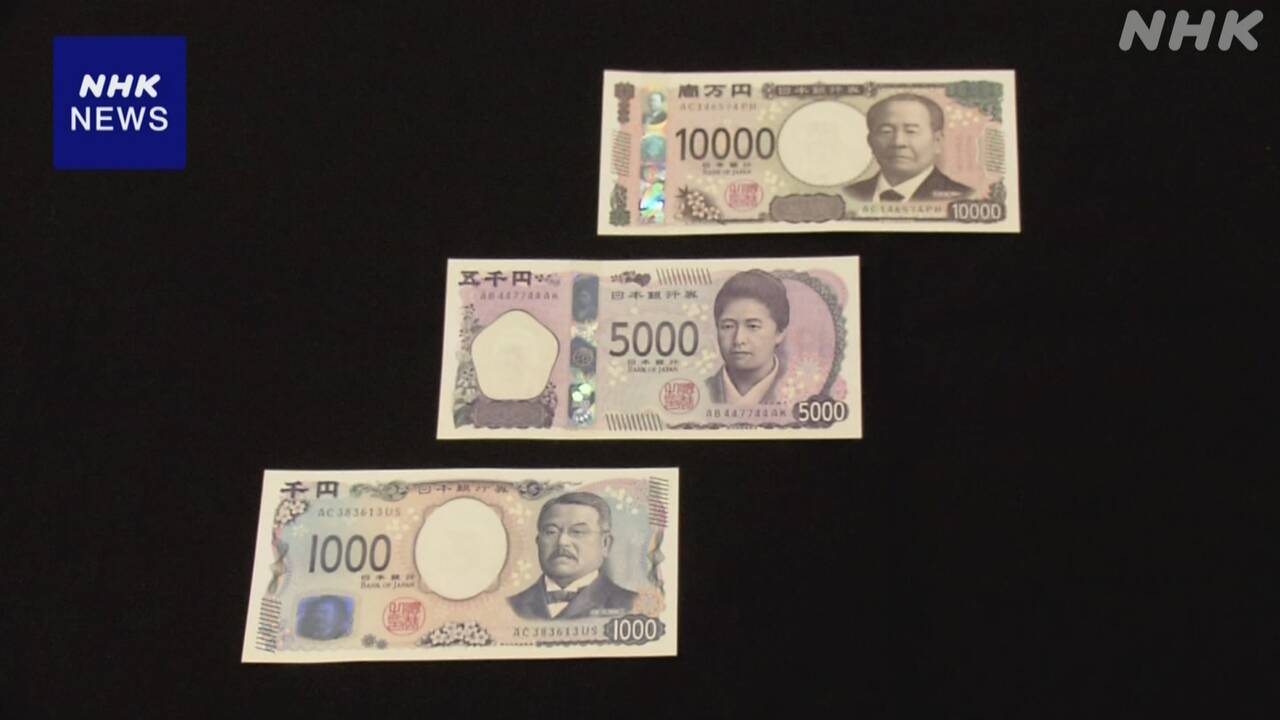Published: 2025-07-01 04:21
新紙幣発行から3日で1年 流通は5月末時点で28.8%

新紙幣が発行されてから7月3日で1年となります。紙幣全体に占める割合はことし5月末の時点で3割に届かず、前回、2004年に新紙幣が発行されたときと比べ、切り替わりのペースが遅くなっていることが日銀の調査でわかりました。
立体的なホログラムを採用した1万円札、5千円札、千円札の新紙幣は去年7月3日から発行が始まりました。
発行主体の日銀によりますと、ことし5月末時点で、金融機関をへて市中に流通している紙幣はおよそ160億枚ですが、このうち新しい紙幣はおよそ50億枚で、全体の28.8%となっています。
2004年11月に新しい紙幣を発行したときは同じ期間で流通する紙幣全体の61%余りを占めていたということで、当時と比べると切り替えのペースが遅くなっています。
日銀では、いわゆるタンス預金の増加などを背景に市中にある紙幣の総量が2004年当時と比べて1.5倍に増えたため、新紙幣の割合が相対的に低くなったと説明しています。
一方、キャッシュレス化に伴って金融機関での紙幣の取り扱いが減っていることや、紙幣の偽造が相次いだ2004年当時と比べると、今回は新紙幣に対する需要が強くないといった背景も、切り替えのペースが遅くなっている背景にあるのではないかとみています。
| # | 言葉 | 意味 |
|---|---|---|
| 13 | 紙幣 | しへい (紙幣) : paper money; note; bill |
| 5 | 発行 | はっこう (発行) : 1. publication; issue (of journal, newspaper, etc.) 2. issue (of banknotes, bonds, passport, etc.) |
| 3 | 全体 | ぜんたい (全体) : whole; entirety; whatever (is the matter) |
| 3 | 遅く | おそく (遅く) : 1. late 2. slowly |
| 3 | 日銀 | にちぎん (日銀) : Bank of Japan; BOJ; BoJ |
| 3 | 札 | さつ (札) : banknote; bill; note; paper money |
| 3 | 当時 | とうじ (当時) : at that time; in those days |
| 3 | 背景 | はいけい (背景) : 1. background; scenery; backdrop; setting 2. background (of an incident, situation, etc.); circumstances; context |
| 2 | 占める | しめる (占める) : 1. to occupy; to hold 2. to account for; to make up; to take up |
| 2 | 末 | うら (末) : top end; tip |
| 2 | 時点 | じてん (時点) : point in time; occasion |
| 2 | 比べる | くらべる (比べる) : 1. to compare; to make a comparison 2. to compete; to vie |
| 2 | 金融機関 | きんゆうきかん (金融機関) : financial institutions; banking facilities |
| 2 | 流通 | りゅうつう (流通) : 1. circulation (money, goods, etc.); distribution 2. circulation (air, water, etc.); ventilation; flow |
| 2 | およそ | およそ (凡そ) : 1. about; roughly; approximately 2. generally; on the whole; as a rule |
| 2 | 切り替え | きりかえ (切り替え) : exchange; conversion; replacement; switching (to); switchover |
| 1 | 割 | わり (割り) : 1. rate; ratio; proportion; percentage 2. profit |
| 1 | 届く | とどく (届く) : 1. to reach; to touch; to get to; to carry (of sound) 2. to be delivered; to arrive |
| 1 | 前回 | ぜんかい (前回) : previous time; last time; previous installment; previous instalment; previous session |
| 1 | 調査 | ちょうさ (調査) : investigation; examination; inquiry; enquiry; survey |
| 1 | わかる | わかる (分かる) : 1. to understand; to comprehend; to grasp; to see; to get; to follow 2. to become clear; to be known; to be discovered; to be realized; to be realised; to be found out |
| 1 | 立体的 | りったいてき (立体的) : three-dimensional |
| 1 | 採用 | さいよう (採用) : 1. use; adoption; acceptance 2. appointment; employment; engagement; recruitment |
| 1 | 始まる | はじまる (始まる) : 1. to begin; to start; to commence 2. to happen (again); to begin (anew) |
| 1 | 主体 | しゅたい (主体) : 1. main constituent; core; nucleus 2. subject (philosophical); protagonist |
| 1 | 期間 | きかん (期間) : period; term; interval |
| 1 | 余り | あまり (余り) : 1. remainder; remnant; rest; balance; surplus; remains (of a meal); leftovers 2. (not) very; (not) much |
| 1 | いわゆる | いわゆる (所謂) : what is called; as it is called; the so-called; so to speak |
| 1 | タンス預金 | タンスよきん (タンス預金) : mattress money |
| 1 | 増加 | ぞうか (増加) : increase; rise; growth; addition; increment |
| 1 | 総量 | そうりょう (総量) : aggregate amount |
| 1 | 増える | ふえる (増える) : to increase; to multiply |
| 1 | 相対的 | そうたいてき (相対的) : relative |
| 1 | 一方 | いっぽう (一方) : 1. one (esp. of two); the other; one way; the other way; one direction; the other direction; one side; the other side; one party; the other party 2. on the one hand; on the other hand |
| 1 | 伴う | ともなう (伴う) : 1. to accompany; to go hand in hand with; to be consequent upon 2. to be accompanied by; to bring with; to take with; to be involved in |
| 1 | 取り扱い | とりあつかい (取り扱い) : treatment; service; handling; management |
| 1 | 減る | へる (減る) : to decrease (in size or number); to diminish; to abate |
| 1 | 偽造 | ぎぞう (偽造) : forgery; falsification; fabrication; counterfeiting |
| 1 | 相 | さが (性) : 1. one's nature; one's destiny 2. custom; tradition; habit; convention |
| 1 | 次ぐ | つぐ (次ぐ) : to rank next to; to come after |
| 1 | 今回 | こんかい (今回) : this time; now |
| 1 | 対する | たいする (対する) : 1. to face (each other); to be facing 2. to be directed toward (the future, etc.); to be in response to; to be related to |
| 1 | 需要 | じゅよう (需要) : demand; request |
| 1 | いう | ゆう (結う) : 1. to do up (hair); to dress; to arrange 2. to tie; to bind; to fasten; to make (a fence) |